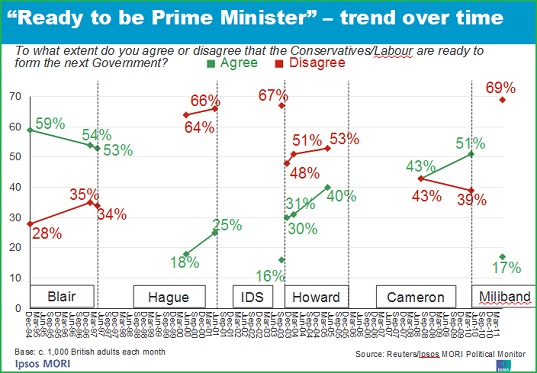 By Rob Marchant / @rob_marchant
By Rob Marchant / @rob_marchant
Steel yourselves. Labour has had a single-figure lead in the polls for a while, but the principal question has always been: is it, like Kinnock’s in the 80s, a soft lead; or a real one? Well, the election results of a couple of weeks back were not great, but yesterday’s/MORI results suggest a considerably bleaker picture.
First the results on the economy: the New Statesman highlights the key result that:
“Asked who they will blame if the economy gets worse over the next 12 months, 22% of respondents say the last Labour government but just 10% say the Tories.”
Let’s reflect on that for a moment: while we are pursuing our “anti-cuts” positioning (ok, ok, “cuts but not this far this fast” positioning), more of the public will blame us than the Tories anyway if things get worse. So, to those who do not believe we have lost the overall-level-of-the-cuts argument and that further economic hardship will drive voters straight into our loving arms, think again.
Second, the poll on the readiness of the Leader of the Opposition (LOTO) to become Prime Minister (Political Betting have a much better copy than in the Ipsos/MORI pack, although the question in the subtitle is for some reason incorrect):

The graph shows how many think the LOTO is ready versus not ready to be PM. The data is not perfect: the sample space is small and there are notable gaps.
However, the differential between the Readies and the Not-Readies could have been accurately used to predict that last four general election results. And the key finding is that, unlike Blair and Cameron, Ed Miliband’s initial polling fits the Hague/Duncan Smith pattern of a seriously negative differential: 69% say not ready versus 17% ready.
Now, the good news is, Ed is at the beginning of his leadership and still has some time to change those numbers. But it is instructive that Blair had a positive differential from the beginning and Cameron from half-way through his leadership (and even he failed to win an overall majority).
So Ed has about three years to cross over from negative into positive and, even then, data which has predicted four general election results could still fail on the fifth. But, it wouldn’t be stretching the point too much to say, on the basis of Cameron’s data, that if Ed isn’t close to crossover by the mid-point, say, 18 months from here, his prospects of an outright election win will look poor. Worse still, the Hague and IDS data show that, once a negative differential is established, it is easily done to languish in the high negatives for one’s whole tenure as leader.
In short: our overall poll lead is indeed showing distinct signs of Kinnockite softness. We need to reflect on why.
Rob Marchant is an activist and former Labour party manager who blogs at The Centre Left.




More from LabourList
Spending Review: ‘Will the PM keep his five missions front and centre?’
‘Six things to take away from Labour’s Hamilton by-election win’
Hamilton by-election: Labour reaction after surprise Holyrood gain from SNP